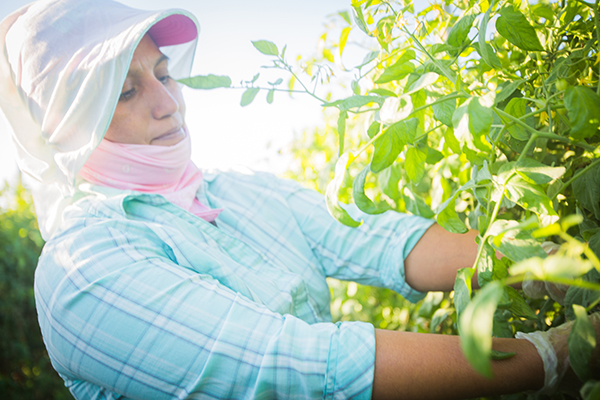
Sunday Times UK Letter to the Editor: The Fair Food Program “harnesses the purchasing power of buyers through legally binding agreements that hold buyers accountable, and it has eradicated slavery and sexual abuse in the fields.”
Earlier this month (and in the wake of the horrific accounts of exploitation facing migrant workers in the Italian and Spanish agricultural industries in The Guardian), the United Kingdom’s Sunday Times published an article on the disturbing conditions on farms in British consumers’ own back yards. Titled “Britain’s biggest trafficking gang used slaves to supply top supermarkets,” the breaking investigative piece not only detailed the treatment of human trafficking victims, but tied their labor to some of the country’s largest food retailers:
A Sunday Times investigation can reveal that the modern-day slaves were forced to work for little or no money. Some of the victims had the task of picking and packing spring onions for a Worcestershire farm. It is part of a fresh-produce group that has customers including Waitrose, Marks & Spencer, Sainsbury’s, Tesco and Asda.
The gang, members of which were finally jailed last week, controlled the victims’ bank accounts and was able to seize more than £2m of their wages. This meant some of the victims earned as little as 50p an hour.
The trafficking gang recruited vulnerable people in Poland — among them the homeless and alcoholics — with the promise of well-paid jobs and accommodation in the UK. But when they arrived they were crammed on filthy mattresses four to a room in vermin-infested properties… READ MORE >>
Within a week of the Sunday Times’ article, Dr. Siobhan McGrath, a researcher with Britain’s Durham University, responded to the investigation with a clear, unequivocal message: The Fair Food Program is a proven solution to just this problem.
Dr. McGrath called on the supermarkets named in the article to go beyond lip service to the idea of protecting human rights in their supply chains, and to use their market power to address – and end – human trafficking:
Buyers beware
Criminal prosecution alone will not change the market dynamics driving the abuse of migrant agricultural labour. We have researched initiatives to address this and found one example that works: the Fair Food Programme in Florida. It harnesses the purchasing power of buyers through legally binding agreements that hold buyers accountable, and it has eradicated slavery and sexual abuse in the fields.
So let us be clear: the big retailers can change this. In the UK, that is you, Waitrose, Marks & Spencer, Sainsbury’s, Tesco and Asda.
Assistant Professor Siobhan McGrath, Durham University
To be sure, the need for the Fair Food Program – both on farms within the UK and on farms across Spain and Italy, the agricultural capitals of the Continent – has never felt more urgent.
The news of the human rights crisis in European agriculture has rippled out across public consciousness, even across the Pond to the U.S. Beyond the Sunday Times piece, as well as the excellent investigative work of the Guardian, the New York Times just last week detailed the ongoing abuse workers face as they harvest Spanish strawberries – known as “red gold”. We will conclude today’s post with a few excerpts from that most recent article in the NY Times, “Workers in Spain’s Strawberry Fields Speak Out on Abuse,” which echoes the Guardian‘s sobering coverage of the industry – and only further underscores the need for change.
Strawberries are called red gold in Spain, the largest exporter of the fruit in Europe, where they are the basis of a $650 million industry. Andalusia, where the women worked, produces 80 percent of Spain’s strawberries.
Under a bilateral agreement signed in 2001, thousands of Moroccan women labor from April to June under sprawling plastic greenhouses to cultivate and harvest the fruit. The agreement specifies that the seasonal workers must come from the countryside, where poverty and unemployment are rampant, and must be mothers, so they want to return home, which most do…
…In addition to the divorces, many of the women said they have been shamed and blamed by some family members and neighbors in Morocco. Many say they suffer from severe panic attacks. During interviews, some cried while others screamed in rage.
The first to speak up was H.H., 37, who said she decided she could no longer endure in silence the harsh working conditions and widespread culture of sexual harassment and even rape at the farm.
“I felt like a slave. Like an animal,” she said during an interview. “They brought us to exploit us and then to send us back. I wish I drowned in the sea and died before arriving in Spain.” …
…The women say they are determined to see their cases through to the end. The initial whistle-blower, H.H., tries to keep spirits up. Whenever one of the women breaks down, she reminds her that it was their duty to speak so that others could work on these contracts without fear.
“I will never let it go,” H.H. said. “I already lost everything. I have nothing to lose. I will fight until I die.”
As somber as it is, make sure to read the full article on the New York Times website.


